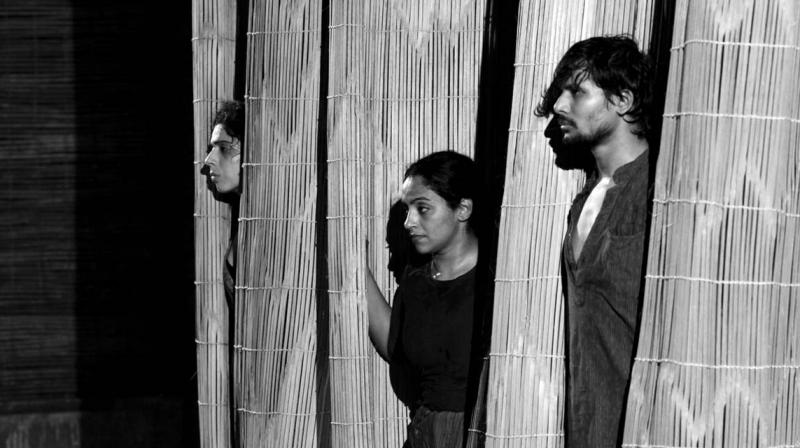Dust: Deconstructing Arundhati Roy’s ammu

Nigel Hurst, CEO at London's Saatchi Gallery, described modern art like this: “If people say it’s art, it’s art. You could say anything is art. If you say it is, I have to judge it on those terms.”
The concept comes from obscurantism, or deliberate vagueness and subjectivism, the idea that the internal experience is the only one we can truly know. And while a pineapple was recently mistaken for an exhibit at a modern art exhibition, the idea of the ‘metaphor’ makes the world of physicality and of words, a more fluid, dynamic entity.
That's how a simple bamboo mat can turn into a house, a tent, a shelter or a confine - as it does in Dust, produced by Across The River Collective, a group of artists from Mexico, India and Australia. Produced by Uma Katju and Alexander Beard, Dust, is a devised theatre performance, largely physical and experimental in nature, that draws inspiration from Arundhati Roy's novel, The God of Small Things.
“We're not telling the story,” says Beto Ruiz, the director. “We use practically no text at all, to allow the power of physical expression to go beyond words.” Two dancers work with a large bamboo mat as the team rehearses at the Attakkalari studio here in Bengaluru. “Even this mat was picked with care. It's not a chair or a table, or something concrete,” Beto explains. It could represent many things - a cave, a tent... even a problem. It depends on how you see it.”
The performance has an Ammu (the protagonist in Roy's novel) and a Velutha (her lover). They meet, they fall in love, this love is not acceptable to society - and the trouble begins. If this is explained to the audience, in words, says Beto, they will remain tied to the story line. Images, however, present a variety of meanings - the two dancers, crowding under a bamboo mat, could be hiding from society's prying eyes, or it could represent the toll that the relationship is taking on them.
In this way, the performance picks up social issues - "It's a journey of men and women returning home, facing restrictions and not being able to fight back," says Beto. "Still, they are trying to reconstruct the problem and make sense of it. Take smoking, for instance. It's taboo, but so common. Being a single mother is an example too, or falling in love with someone from a different economic background."
The Across the River Collective is made up of artistes who worked together as teachers and students at the Intercultural Theatre Institute in Singapore. Why did they choose the God of Small Things? For it’s powerful story, driven by imagery, by sounds that the writer evokes. “We did consider using Perumal Murugan's One Part Woman too but we didn't want to bring in too many ideas and images either,” says Uma.
The artistes read the work and put together their own sets of images, collecting hundreds out of which a handful were chosen. "We have actors from different countries and states in India and here, every state has its own logic. It's so rich, full of cultural nuances." For Beto as well, it was a new way of acquainting himself with Indian society.
“The idea is to re-articulate, rather than adapt. Using a huge collection of sequence, voices and physical movements,” says Beto, we start to re-articulate a new dramaturgy, a new journey. The characters from the novel are there but they are metaphors too - the girl can be from Mexico, Bangladesh or China.”
The audience will get a few prompts along the way, so their understanding moves in a general direction - few lines of text at the start and interspersed into the performance. “The audience doesn't have to worry about being totally lost - there will be prompts. But this is about a sensory experience that leads to understanding.”
Dust premieres at Ranga Shankara on September 10 and 11 at 7.30 pm.

